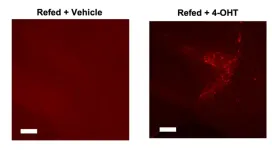(Press-News.org) LA JOLLA, CA—Do you grab a fork and take a first bite of cake, or say no and walk away? Our motivation to eat is driven by a complex web of cells in the brain that use signals from within the body, as well as sensory information about the food in front of us, to determine our behaviors. Now, Scripps Research scientists have identified a group of neurons in a small and understudied region of the brain—the parasubthalamic nucleus (PSTN)—that controls when an animal decides to take a first bite of food.
In the study, published in Molecular Psychiatry on July 4, 2024, the team of scientists set out to selectively manipulate a group of PSTN cells that dial up their activity during periods of binge-eating. Other scientists have observed that many PSTN cells become active following a large meal, but the team wondered how these cells might influence appetite.
“In our study, we used a technique that let us turn on cells in the mouse brain that were activated by a specific experience—in this case, binge-eating,” says Jeff Dunning, PhD, a staff scientist at Scripps Research and first author of the new paper. “Once we have captured this ensemble of PSTN cells, we can turn them on like a light switch and watch what happens to the animals’ eating and drinking.”
The research team found that the ensemble of cells sensitive to binge-eating were capable of drastically changing the behavior of mice. Hungry mice normally start chowing down on food quickly once it becomes available to them. But when researchers turned on this ensemble of PSTN cells, mice were much slower to begin eating and, surprisingly, much faster to drink water.
“Our results tell us that this specific group of PSTN cells guide the early stages of hunger-driven decision making, before eating actually occurs,” says Dunning. “The effect on water drinking is somewhat counterintuitive, but it might be related to prandial thirst—the phenomenon whereby thirst gets stimulated as soon as we start eating.”
By manipulating even smaller sets of cells within the PSTN, the team pieced apart exactly which groups of cells were responsible for the delayed eating and accelerated drinking. They also discovered that yet another group of PSTN cells drives a different effect, urging the mice to eat more sweet foods.
“Altogether, these results reveal that PSTN neurons exert a complex combination of functions,” says senior author Candice Contet, PhD, associate professor in the Department of Molecular Medicine at Scripps Research. “Several studies had previously shown that PSTN activity can limit the amount of food eaten, but the fact that certain PSTN neurons control the onset of feeding or drinking, or even promote the consumption of food ‘treats,’ is entirely novel.”
Contet, Dunning and colleagues think that their findings may have relevance for eating disorders where people have either too much or not enough control over the initiation of feeding—the decision to succumb to that first bite or wait longer. Beyond food and water, similar mechanisms may be at play in the loss of control over the consumption of rewarding substances such as drugs of abuse, which the team is currently investigating.
In addition to Contet and Dunning, authors of the study, “The parasubthalamic nucleus refeeding ensemble delays feeding initiation and hastens water drinking,” include Catherine Lopez, Colton Krull, Max Kreifeldt, Maggie Angelo and Leeann Shu of Scripps Research; and Charu Ramakrishnan and Karl Deisseroth of Stanford University.
This work was supported by funding from the National Institutes of Health (AA026685, AA027636, AA006420, AA027372, and AA007456).
About Scripps Research
Scripps Research is an independent, nonprofit biomedical institute ranked one of the most influential in the world for its impact on innovation by Nature Index. We are advancing human health through profound discoveries that address pressing medical concerns around the globe. Our drug discovery and development division, Calibr-Skaggs, works hand-in-hand with scientists across disciplines to bring new medicines to patients as quickly and efficiently as possible, while teams at Scripps Research Translational Institute harness genomics, digital medicine and cutting-edge informatics to understand individual health and render more effective healthcare. Scripps Research also trains the next generation of leading scientists at our Skaggs Graduate School, consistently named among the top 10 US programs for chemistry and biological sciences. Learn more at www.scripps.edu.
END
Researchers pinpoint brain cells that delay first bite of food
A set of neurons identified by Scripps Research scientists influence the start of eating and drinking.
2024-07-11
ELSE PRESS RELEASES FROM THIS DATE:
With spin centers, quantum computing takes a step forward
2024-07-11
RIVERSIDE, Calif. -- Quantum computing, which uses the laws of quantum mechanics, can solve pressing problems in a broad range of fields, from medicine to machine learning, that are too complex for classical computers. Quantum simulators are devices made of interacting quantum units that can be programmed to simulate complex models of the physical world. Scientists can then obtain information about these models, and, by extension, about the real world, by varying the interactions in a controlled way and measuring the resulting behavior of the quantum simulators.
In a paper published in Physical Review B, a UC Riverside-led research team ...
Scientists release new research on planted mangroves’ ability to store carbon
2024-07-11
U.S. Forest Service ecologists and partners published new findings on how planted mangroves can store up to 70% of carbon stock to that found in intact stands after only 20 years.
Researchers have long known that mangroves are superstars of carbon absorption and storage. But until now, limited information existed on how long it took for carbon stored in planted mangroves to reach levels found in intact mangroves.
“About ten years ago, Sahadev Sharma, then with the Institute of Pacific Islands Forestry, and I discovered that 20-year-old mangrove plantations in Cambodia had carbon stocks comparable to those of intact forests,” ...
New immune cell therapy benefits laboratory models of ALS and has some positive results in an individual with the disease
2024-07-11
Immune system dysregulation and elevated inflammation contribute to the development of the fatal neurodegenerative condition amyotrophic lateral sclerosis (ALS), also known as Lou Gehrig's disease.
In new research published in The FASEB Journal, repeated infusions of certain immune cells delayed ALS onset and extended survival in mice, and also reduced markers of inflammation in an individual with the disease. The work was conducted by investigators at Massachusetts General Hospital, a founding member of the Mass General ...
Trial of cell-based therapy for high-risk lymphoma leads to FDA breakthrough designation
2024-07-11
CAR-T cell therapy, which targets a specific protein on the surface of cancer cells, causes tumors to shrink or disappear in about half of patients with large B-cell lymphoma who haven’t experienced improvement with chemotherapy treatments.
But if this CAR-T treatment fails, or the cancer returns yet again — as happens in approximately half of people — the prognosis is dire. The median survival time after relapse is about six months.
Now, a phase 1 clinical trial at Stanford Medicine ...
Major trial looks at most effective speech therapy for people with Parkinson’s disease
2024-07-11
A major clinical trial, led by experts at the University of Nottingham, has shown the Lee Silverman Voice Treatment (LSVT LOUD®) is more effective than the current speech and language therapy provided by the NHS, when treating patients with Parkinson’s disease (PD).
The results of the NIHR HTA funded trial, which are published today in the BMJ, showed that LSVT LOUD® was more effective at reducing the participant’s reported impact of voice problems than no speech and language therapy, as well as the NHS delivered speech and language therapy.
The trial was led by experts from the Universities of Nottingham and Birmingham, ...
Intensive voice treatment more effective than NHS speech therapy for Parkinson’s disease
2024-07-11
An intensive voice treatment developed in the USA and known as the Lee Silverman voice treatment (LSVT LOUD) is more effective than conventional NHS speech and language therapy or no therapy for people with Parkinson’s disease, finds a trial published in The BMJ today.
The researchers say the results emphasise the need to optimise the use of speech and language therapy resources for people with Parkinson’s disease.
Slurred or slow speech (known as dysarthria) is a common feature of Parkinson’s disease and can have a significant effect ...
NHS’s relentless focus on finance and productivity is failing patient safety
2024-07-11
“The NHS’s relentless focus on finance and productivity is failing patient safety,” argues patient safety commissioner Henrietta Hughes in an interview for The BMJ today.
“The patient’s anecdote is the canary in the coal mine,” she says. It’s the thing that tells us there’s something going wrong. But too often we hear about patients who have raised concerns being gaslighted, dismissed, and fobbed off.”
Hughes, a GP and former medical director at NHS England, became England’s first independent patient safety commissioner in September 2022.
The job was created ...
World leaders unite to embed social participation in health systems
2024-07-11
For the first time in the World Health Organization’s 76 year history, world leaders have unanimously committed to put social participation - people, communities and civil society - at the heart of health decision making processes.
This landmark pledge marks an important step forward in creating a healthy world, say experts in The BMJ today, and they urge everyone to seize their right to influence the decisions that affect their health and well-being.
Global challenges such as access to care, climate change, widening ...
AI Chatbots have shown they have an ‘empathy gap’ that children are likely to miss
2024-07-11
Artificial intelligence (AI) chatbots have frequently shown signs of an “empathy gap” that puts young users at risk of distress or harm, raising the urgent need for “child-safe AI”, according to a study.
The research, by a University of Cambridge academic, Dr Nomisha Kurian, urges developers and policy actors to prioritise approaches to AI design that take greater account of children’s needs. It provides evidence that children are particularly susceptible to treating chatbots as lifelike, quasi-human confidantes, ...
Dante on the Move: Refugee’s share experiences through the lens of 14th century poet
2024-07-11
International refugees and academic experts have contributed to a new book examining the resonance of Dante’s Divine Comedy with today’s migrants fleeing the troubles in their home countries.
Dante on the Move is launched in Rome today (Thursday 11th July) and has been produced as part of a research project Reading Dante with Refugees led by the University of Birmingham and Trinity College Rome. It features work by people from Afghanistan, China, Egypt, Iran, Iraq, Kurdistan, Ukraine, the USA and Venezuela.
Mohammed, a Kurdish refugee from Iraqi and contributor to the book survived a shipwreck in the Mediterranean in which many people drowned. He said: “Reading ...
LAST 30 PRESS RELEASES:
Black soldier fly larvae show promise for safe organic waste removal
People with COPD commonly misuse medications
How periodontitis-linked bacteria accelerate osteoporosis-like bone loss through the gut
Understanding how cells take up and use isolated ‘powerhouses’ to restore energy function
Ten-point plan to deliver climate education unveiled by experts
Team led by UC San Diego researchers selected for prestigious global cancer prize
Study: Reported crop yield gains from breeding may be overstated
Stem cells from human baby teeth show promise for treating cerebral palsy
Chimps’ love for crystals could help us understand our own ancestors’ fascination with these stones
Vaginal estrogen therapy not linked to cancer recurrence in survivors of endometrial cancer
How estrogen helps protect women from high blood pressure
Breaking the efficiency barrier: Researchers propose multi-stage solar system to harness the full spectrum
A new name, a new beginning: Building a green energy future together
From algorithms to atoms: How artificial intelligence is accelerating the discovery of next-generation energy materials
Loneliness linked to fear of embarrassment: teen research
New MOH–NUS Fellowship launched to strengthen everyday ethics in Singapore’s healthcare sector
Sungkyunkwan University researchers develop next-generation transparent electrode without rare metal indium
What's going on inside quantum computers?: New method simplifies process tomography
This ancient plant-eater had a twisted jaw and sideways-facing teeth
Jackdaw chicks listen to adults to learn about predators
Toxic algal bloom has taken a heavy toll on mental health
Beyond silicon: SKKU team presents Indium Selenide roadmap for ultra-low-power AI and quantum computing
Sugar comforts newborn babies during painful procedures
Pollen exposure linked to poorer exam results taken at the end of secondary school
7 hours 18 mins may be optimal sleep length for avoiding type 2 diabetes precursor
Around 6 deaths a year linked to clubbing in the UK
Children’s development set back years by Covid lockdowns, study reveals
Four decades of data give unique insight into the Sun’s inner life
Urban trees can absorb more CO₂ than cars emit during summer
Fund for Science and Technology awards $15 million to Scripps Oceanography
[Press-News.org] Researchers pinpoint brain cells that delay first bite of foodA set of neurons identified by Scripps Research scientists influence the start of eating and drinking.



